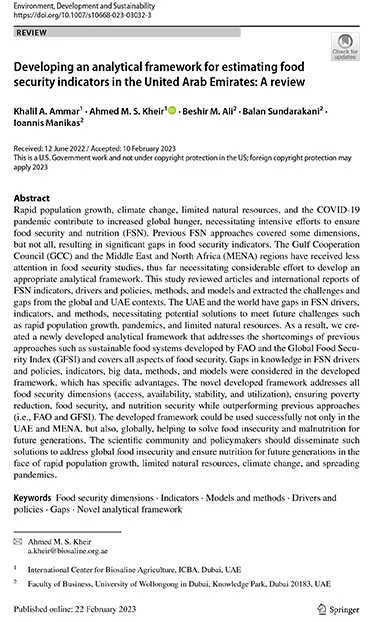Developing an analytical framework for estimating food security indicators in the United Arab Emirates: A review
Rapid population growth, climate change, limited natural resources, and the COVID-19 pandemic contribute to increased global hunger, necessitating intensive efforts to ensure food security and nutrition (FSN). Previous FSN approaches covered some dimensions, but not all, resulting in significant gaps in food security indicators. The Gulf Cooperation Council (GCC) and the Middle East and North Africa (MENA) regions have received less attention in food security studies, thus far necessitating considerable effort to develop an appropriate analytical framework. This study reviewed articles and international reports of FSN indicators, drivers and policies, methods, and models and extracted the challenges and gaps from the global and UAE contexts. The UAE and the world have gaps in FSN drivers, indicators, and methods, necessitating potential solutions to meet future challenges such as rapid population growth, pandemics, and limited natural resources. As a result, we created a newly developed analytical framework that addresses the shortcomings of previous approaches such as sustainable food systems developed by FAO and the Global Food Security Index (GFSI) and covers all aspects of food security. Gaps in knowledge in FSN drivers and policies, indicators, big data, methods, and models were considered in the developed framework, which has specific advantages. The novel developed framework addresses all food security dimensions (access, availability, stability, and utilization), ensuring poverty reduction, food security, and nutrition security while outperforming previous approaches (i.e., FAO and GFSI). The developed framework could be used successfully not only in the UAE and MENA, but also, globally, helping to solve food insecurity and malnutrition for future generations. The scientific community and policymakers should disseminate such solutions to address global food insecurity and ensure nutrition for future generations in the face of rapid population growth, limited natural resources, climate change, and spreading pandemics.
Year
2023
Publication Source
Environment, Development and Sustainability
Publication type
Scientific Paper









